 Gordon Brown has announced that a new labelling system for media content is in the works, designed to help parents protect their children from dodgy digital content.
Gordon Brown has announced that a new labelling system for media content is in the works, designed to help parents protect their children from dodgy digital content.
The idea is that a system similar to cinema classifications would be introduced to classify content on websites, video games, TV shows and other media content.
Backed by industry regulator Ofcom, Brown intoned that the system would offer practical help to parents concerned about their little darlings being exposed to new media outlets seemingly stuffed to the brim with violent imagery, drugs and hot, hot sex.
Commenting on the veritable torrent of filth that virtually seeps out of every child’s PC as soon as they connect to the web, Brown said that it is an “issue we must address with practical proposals to address the challenges we face.”
“We want to promote a culture which favours responsibility and establishes boundaries: limits of what is acceptable and unacceptable.”
“We can’t and shouldn’t seek to turn the clock back on technology and change. Rather we need to harness new technology and use it to enable parents to exercise the control they want over the new influences on their children,” he added.
 As part of the scheme, Ofcom will introduce common labelling standards covering cinema, TV, radio, computer games and the internet.
As part of the scheme, Ofcom will introduce common labelling standards covering cinema, TV, radio, computer games and the internet.
These will be backed up by an awareness campaign advising parents about content filtering software for PCs, and information about TV set top boxes which can limit what can and cannot be seen by little Timmy and Tabatha.
Brown added that they’ll also be looking at persuading technology manufacturers to provide better information on software to block content unsuitable for children, as well as investigating new methods to restrict access to saucy and violent content shared over the t’web.
Brown recognised that it’s a fat look of good trying to implement restrictions on just a national scale, pointing out that agreements need to be struck at the international level.
“We need to support all those broadcasters and providers doing a huge amount and of course we need to recognise there are global markets where we need international agreement,” he said, somewhat understating the importance of worldwide standards.
Of course, many companies and public institutions already use web filtering software but their methods can often resemble a 300 ton sledgehammer cracking a dwarf-sized peanut.
Scunthorpe. Arsenal. And Sex
The denizens of Scunthorpe and fans of Arsenal football club have already famously fallen foul of none-too-smart naughty word blockers, and many sites have complained about being blocked for the most spurious of reasons, with very little chance of retribution.
Some sites about UK counties have also found themselves banned from libraries and internet cafes because the word ‘sex’ has appeared in their domain name – even though the sites are about subjects as unerotic as Sussex, Essex and Wessex.
More about word filtering mistakes here: The Scunthorpe Problem
[From: Brown unveils classification system for new media]
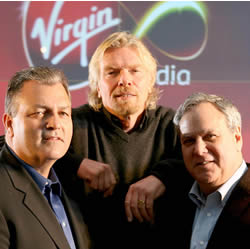 The upload speed will also be upped to 768Kbs, not exactly setting the uploading world alight, but better than a poke in the eye with a stick, non?
The upload speed will also be upped to 768Kbs, not exactly setting the uploading world alight, but better than a poke in the eye with a stick, non?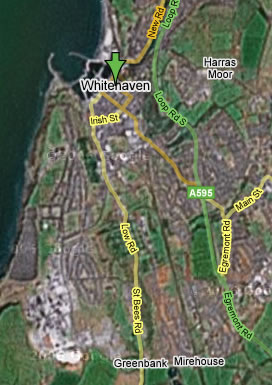 It’s quite an interesting approach that’s worthy of a little attention, especially as this will form the basis for the approach for the rest of the UK.
It’s quite an interesting approach that’s worthy of a little attention, especially as this will form the basis for the approach for the rest of the UK.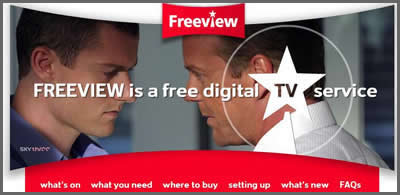
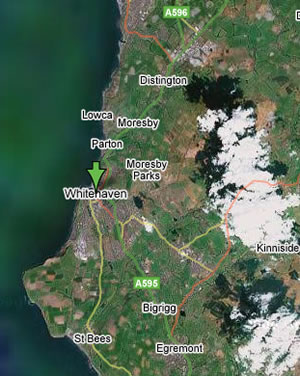 Back in June last year, we heard that
Back in June last year, we heard that  The quarterly report snappily titled, Communications Market: Digital Television Progress Report, covering the fourth quarter of 2006 (October-December), shows the figures are up from 39% in the same period the previous year, and also from 44.7% in the Q3 2006.
The quarterly report snappily titled, Communications Market: Digital Television Progress Report, covering the fourth quarter of 2006 (October-December), shows the figures are up from 39% in the same period the previous year, and also from 44.7% in the Q3 2006.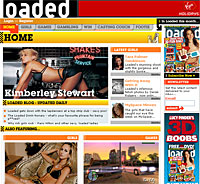 Blokes are generally an easily pleased bunch when it comes to magazines – just shove in loads of high tech gadgets, big cars, some football, lots of wobbling booby babes, video game reviews, pics of dangerous sports and perhaps a page or two on cooking to show off their sensitive side – and they’re as happy as a pig in dirt.
Blokes are generally an easily pleased bunch when it comes to magazines – just shove in loads of high tech gadgets, big cars, some football, lots of wobbling booby babes, video game reviews, pics of dangerous sports and perhaps a page or two on cooking to show off their sensitive side – and they’re as happy as a pig in dirt. The phwoaar-tastic Loaded site apparently has the “greatest affinity” with men, with 88% of visitors to their site being of the geezer persuasion, followed by Nuts (83%) and Zoo (81%).
The phwoaar-tastic Loaded site apparently has the “greatest affinity” with men, with 88% of visitors to their site being of the geezer persuasion, followed by Nuts (83%) and Zoo (81%). “The last quarter has seen the big three online men’s lifestyle magazines – Maxim, FHM and Monkey – vying for top spot. On its official launch in November 2006, Monkey climbed straight to the top of the tree but the last two months have seen a slight, if steady, drop in popularity to fall behind Maxim and FHM,” commented Alex Burmaster, European Internet Analyst, Nielsen//NetRatings, commented:
“The last quarter has seen the big three online men’s lifestyle magazines – Maxim, FHM and Monkey – vying for top spot. On its official launch in November 2006, Monkey climbed straight to the top of the tree but the last two months have seen a slight, if steady, drop in popularity to fall behind Maxim and FHM,” commented Alex Burmaster, European Internet Analyst, Nielsen//NetRatings, commented: Major news agencies made great use of public camera phone footage after the London 7/7 bombings, with several images
Major news agencies made great use of public camera phone footage after the London 7/7 bombings, with several images  With Getty’s well established media network, amateur snappers should expect increased prospects of shifting their work, although Getty hasn’t commented if the payment share is to remain the same.
With Getty’s well established media network, amateur snappers should expect increased prospects of shifting their work, although Getty hasn’t commented if the payment share is to remain the same.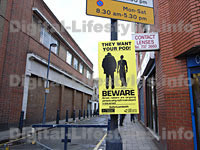 Although some may already feel that walking around Brixton is akin to taking a stroll around another planet, we began to think we might have been transported to a parallel universe when we spotted bright garish yellow billboards appearing all around town exclaiming, “THEY WANT YOUR POD!”
Although some may already feel that walking around Brixton is akin to taking a stroll around another planet, we began to think we might have been transported to a parallel universe when we spotted bright garish yellow billboards appearing all around town exclaiming, “THEY WANT YOUR POD!”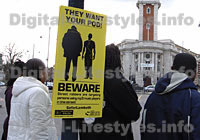 In smaller text underneath the screaming headline, “BEWARE” the sign goes on, “Street robbers are targeting persons using mp3 music players in this street!”
In smaller text underneath the screaming headline, “BEWARE” the sign goes on, “Street robbers are targeting persons using mp3 music players in this street!”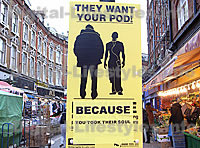 Although the sign doesn’t actually tell you what to do to prevent being ‘jacked’ (
Although the sign doesn’t actually tell you what to do to prevent being ‘jacked’ (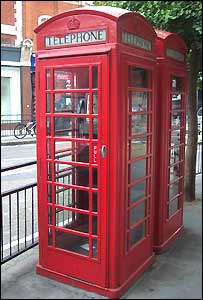 BT is under a legal obligation to provide phone boxes up and down the length of the UK, which they claim numbers 63,795. BT say that 40,500 of these phone boxes are unprofitable.
BT is under a legal obligation to provide phone boxes up and down the length of the UK, which they claim numbers 63,795. BT say that 40,500 of these phone boxes are unprofitable.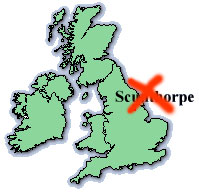 Gordon Brown has announced that a new labelling system for media content is in the works, designed to help parents protect their children from dodgy digital content.
Gordon Brown has announced that a new labelling system for media content is in the works, designed to help parents protect their children from dodgy digital content. As part of the scheme, Ofcom will introduce common labelling standards covering cinema, TV, radio, computer games and the internet.
As part of the scheme, Ofcom will introduce common labelling standards covering cinema, TV, radio, computer games and the internet.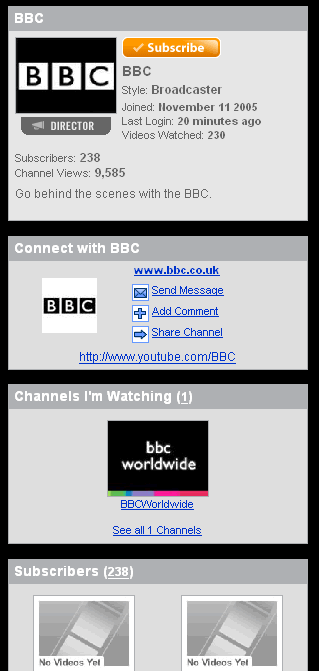 Two deals have been done, one with the BBC, the other BBC Worldwide, the commercial arm of the BBC. Financial terms of the deal aren’t being discussed at all.
Two deals have been done, one with the BBC, the other BBC Worldwide, the commercial arm of the BBC. Financial terms of the deal aren’t being discussed at all.